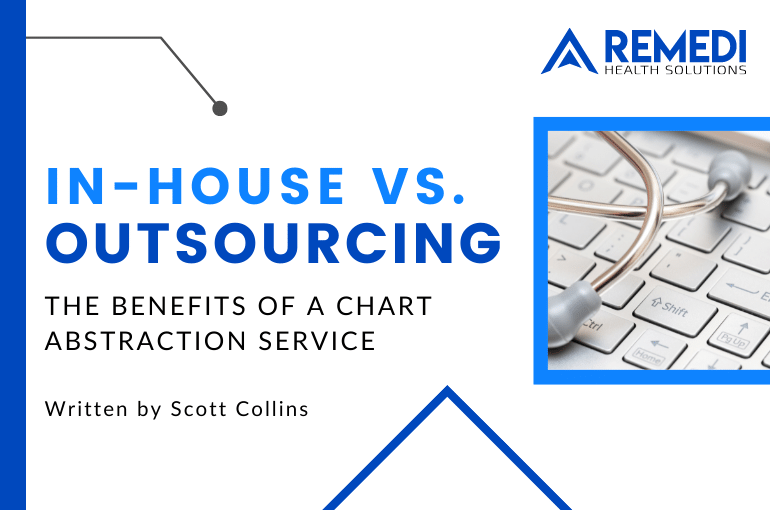
Articles, Data Migration, EHR, Healthcare, Leadership October 4, 2022
In-house vs. Outsourcing: The Benefits of a Chart Abstraction Service
This article was originally published on LinkedIn by ReMedi’s Chief Revenue Officer, Scott Collins.
Sometimes you have to let go. As an entrepreneur, business leader, and a father, it took the longest time in all three roles to figure out that maybe, just maybe I was holding on too tight to the daily minutia of my role. As an entrepreneur I wanted to make all of the decisions regarding the direction of the companies I founded, as a business leader I could take on my role and everyone else’s just because I needed it to get done, and as a father, well… I’m still learning.
When it comes to healthcare organizations taking on new or existing projects, I’ve experienced similar sentiments. I’ve heard phrases such as “my team can handle that” or “we do that in-house”. This is no discredit to the leaders in our industry or the faith that we have in our teams’ capabilities, but rather a nod to today’s staffing shortages, increase in employee burnout, and the rising cost of resources.
Outsourcing services is nothing new to healthcare – but it is more important today than ever. For example, let’s talk clinical data/chart abstraction. When acquiring or merging with other healthcare entities, or even transitioning to a new EHR system, healthcare organizations have the skillsets, know-how, and overall expertise within the four walls to provide chart abstraction in-house. This seems to be the smarter, more affordable, and most convenient option. But that’s not necessarily true. Enlisting the help of a clinical abstraction service can provide more complete and accurate patient charts without placing any additional burden on your clinicians.
The end result – making an acquisition or EHR transition more efficient and often at a lower cost than managing the process on your own.
Less burden on clinicians
Clinician burnout is at an all-time high. We are not just speaking of physicians, but our nurses as well. Clinicians are committed to providing the best care possible and if that means completing or correcting patient charts at home, many will do it. But is that really in the best interest of your organization, healthcare staff, or patients? Probably not. A little more personal time goes a long way for morale and better patient care.
More accurate, timely patient data
By outsourcing your chart abstraction to a clinically experienced team, providers find the information they need when they need it, allowing the best delivery for quality care. Clinicians don’t feel like they are rushing to access accurate data into the patient chart (risking certain data points like medications, allergies, etc.) and existing patients get the familiar attention they deserve. Clinicians feel valued and patients feel cared for, keeping everyone’s satisfaction levels high.
Lower costs, higher efficiency
With staffing shortages and increasing wages, keeping your chart abstraction in-house can become expensive. Clinicians are working overtime to ensure that charts are complete. With that comes higher overtime rates. Those costs add up quickly. Outsourced services typically offer a rate that is more competitive than what you’d wind up paying your clinicians.
Outsourcing chart abstraction can also improve the quality of care and increase patient volumes. When providers can focus solely on care, each visit moves faster, taking up less time and creating space for increased patient volume. It also improves care by making each visit more patient-centric resulting in higher patient retention – a topic for another day.
Final thoughts
Is it possible to manage your chart abstraction in-house? Yes. But should you? I’d argue you shouldn’t. With the rise of clinician burnout, wage increases, and the competitive landscape of healthcare, outsourcing chart abstraction to clinical experts leads to more accurate data that’s available to providers when they need it. You can avoid burnout by not overloading your team with additional abstraction responsibilities while improving the overall efficiency of the process… and potentially save a few bucks along the way.
Scott Collins is the Chief Revenue Officer for ReMedi Health Solutions. Learn more about Chart Abstraction Services or contact Scott at s.collins@remedihs.com.
